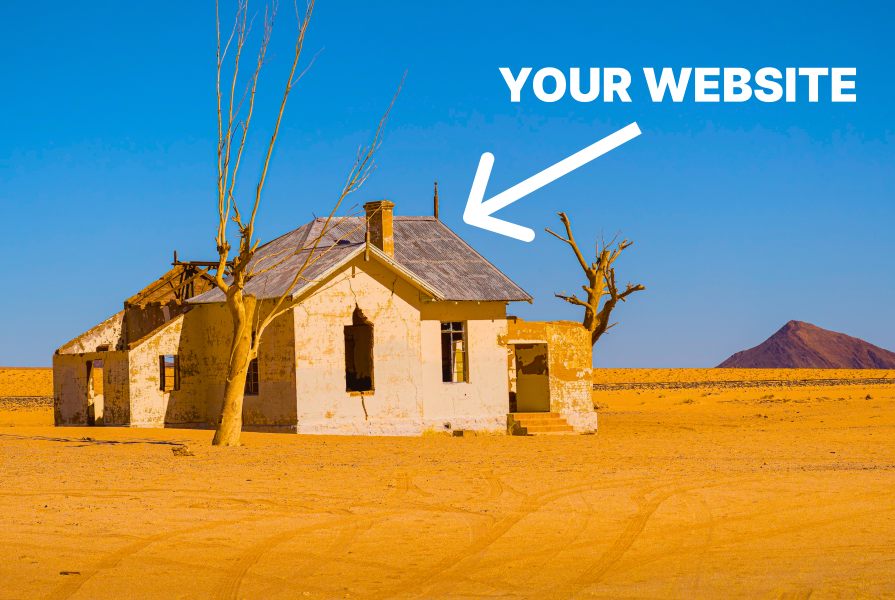If we’re being completely honest, SEO is all about getting to the number one position. It’s right there in the name: Search Engine Optimization.
Unfortunately, like anything worth doing, SEO is easier said than done. To achieve SEO success, you’re going to have to flip every switch and optimize every little aspect of what decides those rankings. Any little boost can give you an edge in that battle for the top.
Daunting? We know. So, let’s organize things a little. All SEO elements can be divided into two fields: on-page and off-page SEO.
This likely created more questions, like “What is on-page SEO?”, “How is it different from off-page SEO?” and “How can I get both of them to work successfully together?”
We’ll help you understand the differences and importance of each and how they can significantly impact your website’s performance.
On-page SEO vs. Off-page SEO: This analogy might help
On-page SEO includes everything you can do on your website itself to make it rank higher in search engines. On the other hand, off-page SEO involves optimizing things outside of your site to help it rank higher.
One way of looking at them is like the music business, where getting to number one in the charts is the primary measure of success, but how does a song get there? Sure, the content, i.e., the song itself, matters: how it sounds, who produces it, what the lyrics say, and who it connects with. But that’s not all that’s necessary to get a record to the top. Artists or managers also need connections with DJs so the song gets played. They need to create hype on social media so people want to check it out, use word-of-mouth to spread it and look at different avenues of promotion. If they get the song on a commercial or movie, its popularity will skyrocket. Success can come from various avenues or all of them combined.
In terms of SEO, it’s pretty much the same dynamic. On-page SEO has everything to do with the content you produce and how you present it. Off-page SEO covers the promotion of that content outside of your own channels and paid advertising; this includes links from other pages and their quality and domain-level factors, such as the general authority and trust of your site and social media.
That’s the basic answer to questions like ‘what is off-page SEO?’, but of course, there’s a whole lot more to it than that. As Google’s search engine continues to evolve, it weighs both factors around 50-50 when ranking search results. It’s vital to know what to do for both. So, let’s get deeper into what on-page SEO and off-page SEO really mean and how you can maximize their SEO potential.

What is on-page SEO?
On-page SEO, also called “on-site SEO,” is the process of making web pages and their content more search engine friendly and better for people to use. This process raises the rank of pages on search engines like Google, which brings in more free traffic. Some important parts of on-page SEO are optimizing copy for search purposes, improving title tags, creating internal links, and making sure URLs are properly structured.
On-page SEO is the more familiar of the two ranking categories. It deals with things that you have control over, namely what appears on your site and how. The ‘what’ of on-page SEO is the content, which is generally written but can include video, images, infographics, or interactive elements like quizzes or games. The ‘how’ is the technical aspects of how your site displays that content and the efforts you have made to help search engines connect it to a search query.
Here’s a look at some of the most important aspects of on-page SEO.
Content
Regardless of its form, content is the foundation of every SEO strategy. Without content, there is literally nothing for a search engine to find and serve up to their users. To maximize the effectiveness of your content for your on-page SEO, it’s important to take the following into account:
Keywords
Keywords have always been one of the most important indicators to a search engine of what content is about. The primary idea is that if you want people to find your page when they search for a keyword, it should be on your page. EX. If your webpage is about flowers, include the word “flowers” where relevant. Don’t just copy and paste it a thousand times; that’s called keyword stuffing, and search engines got wise to this spammy move a long time ago.
Quality
As you can’t just ‘stuff’ your content with keywords, good on-page SEO means creating what Google has deemed helpful, reliable, people-first content so visitors stay on the page longer and get something out of it. Staying on the page tells the search engine the searcher found what they wanted, which means your page was very relevant to their query. High quality also means high shareability.
While it seems counterintuitive, ensure your content appeals to those looking for it, not the search engines. Google has been working long and hard to make these one and the same and continues to push toward that goal with each algorithm update.
Meta tags
Meta titles and descriptions are the first snippets that tells a searcher what your page is about. Keep it short and to the point. The user and the search engine will thank you.
Recency
The younger (or most recently updated) something is, the more relevant it is, at least according to search engines. Or at least users respond better to more up-to-date information, so keeping your content fresh and updated is crucial for maintaining its relevance and ranking potential.
Technical on-page SEO
Beyond the visible content, on-page SEO relies heavily on technical aspects of your website to boost its ranking power. Some important things to think about are :
- Page load speed: An SEO-friendly page needs to load quickly because page speed is directly tied to SEO. Page speed affects the user experience by determining how long people stay on a page and how quickly they leave.
- Layout: An easy-to-use layout and navigation make for a better experience and impact Google’s rankings. Search engines and users can both easily find information on a site that is well organized.
- Security: Google has made website security a direct ranking factor, and sites without ‘https’ with SSL security are severely punished, even if they do not appear on organic search engine results pages. To stay visible in organic search results, you need to make sure your site is safe.
- CSS and HTML: Organizing your page’s code to make it easily readable and in the order you want can make a big difference to your on-page SEO.
- Mobile-friendliness: Everyone and their moms are using the internet on their phones, so it’s essential to have a site that works well on those devices. Search engines give more weight to sites that work well on mobile devices, so this factor greatly affects search results.
What is off-page SEO?
Off-page SEO, also called off-site SEO, involves actions taken outside your websites to help your site rank higher in search engine results pages (SERPs) and change how people find and interact with your content. Off-page SEO is the art of building relationships and maximizing recognition outside of your own site. It’s about letting search engines know how your site fits into the community; do people in the field know you, trust you, and value your input?
Some of the most important tactics are building high-quality backlinks, interacting on social media, guest blogging, influencer marketing, submitting to online directories, using public relations, and getting people to talk about your brand. These tactics work together to improve your website’s authority, relevance, and reliability.
As mentioned, the on-page/off-page split is about 50-50, and search engines view off-page SEO as important because it’s the digital version of word-of-mouth. Like in the music industry, a DJ isn’t going to just play every Soundcloud link from aspiring artists that get DM’d to them, but if someone they know and trust gets in touch and says they’ve got the next big hit on their hands, they’ll give it a shot.
Search engines leverage this community recognition and trust to give their searchers the optimum results for their queries. They want to be able to say that this brand is number one because that’s who people in the industry believe is the best. It means someone can’t ‘game’ the system by just doing all of their on-page SEO right; they have to actually be offering something that people vouch for and recommend.
The most common off-page SEO techniques that you might be familiar with have to do with linking, but there’s a whole lot more to it than that. These are a few key factors that can help to understand what off-page SEO is all about:
Linking
- Inbound links: Whenever someone else posts a link to your content, search engines view this as a recommendation or vote of confidence, boosting your credibility.
- Anchor text: The keywords used in the hyperlink’s text let the search engine know the link’s context.
- Domain authority: The higher the authority of the page that’s linking to you, the more influential the recommendation.
Community
- Geographic location: This refers to your physical location and the market you serve. It is very important for local search results, enhancing your visibility in local searches.
- Social media indicators: Likes, shares, and links in social media posts from unrelated accounts contribute to your site’s perceived value and recognition.
- Mentions: Not all positive linking has to be hyperlinked. Search engines also count when a brand is mentioned in passing or in conversations.
Off-page SEO techniques that will boost your rankings
So now, next time someone asks, “What is off-page SEO?” You should have a better idea. But it’s not good enough to just understand what it is; you need to know how to make it work for you. Here are some of the best off-page SEO techniques that you can start putting into practice right away.
Engaging with your community:
Social media for businesses can be much more helpful than just another medium for ads or offers. By building a community of loyal customers and interested followers, you have an instant audience that can help you drive traffic. The key is to treat your community like normal people and engage with them about things that might actually interest them or add to their lives, rather than just following the lazy marketer’s tactic of doing nothing but spamming links to your own content.
Establishing yourself as an authority:
There are many online forums, such as Reddit or Quora, as well as real-life situations, such as industry podcasts and conferences, where you can display your credentials as a thought leader in your field. It’s always good to be connected with the rest of one’s professional community to keep your finger on the pulse of the industry, but by fostering a reputation as someone who really knows what they’re talking about. You’ll be more likely to be trusted and linked when you drop some new content.
Get discussions going:
Most people just write their blogs, post them, and leave it at that. But why? You’ve spent time working on some content that you really like and imbued it with your own personality and identity, so why not use it as a jump-off piece for a conversation with your audience? Lots of major sites are turning the tide against unhelpful comment spam and making their content the foundation of healthy discussion. Encouraging comments, questions, and discussions can keep your content alive and engaging, extending its reach and impact.
Something to keep in mind: You definitely want to moderate who can leave comments. Leaving your blogs open to comments from any account will lead to spam and garbage.
Be smarter about guest blogging:
Guest blogging is one of the most popular off-page SEO techniques for building links from other sites. You get in touch with the site owner, offer to do some content for them for free, and you get to include links back to your page. While this seems like a simple win-win, it’s a process that can be greatly improved.
It’s more important to focus on delivering value rather than just link-spamming. If you do quality work, it increases the chances of that content being shared further, plus it shows respect for the host site. It’s also good to maintain a healthy relationship with the host site by following and interacting with the publisher outside of just the guest content you create instead of just performing a blog hit-and-run.
The focus should not just be on link-building but rather relationship-building.
Trust the on and off-page experts at Redefine
SEO is a complex process, similar to making a great song and then making sure it reaches its loving audience. A rockstar content writer can produce magic, but there needs to be a comprehensive support structure in place to bring it to the masses. Understanding on-page and off-page SEO, their components, and their significance is the first step. Next, you need to refine your on and off-page SEO techniques to achieve your brand’s goals. Master these elements, and success will follow.
Fortunately, you won’t have to go it alone. At Redefine Marketing Group, we strive to be more than just experts in our field; we want to be partners that help you get the growth you want. Our team stays updated on the latest SEO trends and algorithm changes to ensure your strategy is always cutting-edge. Get in touch with us right away to find out how we can help you achieve!





